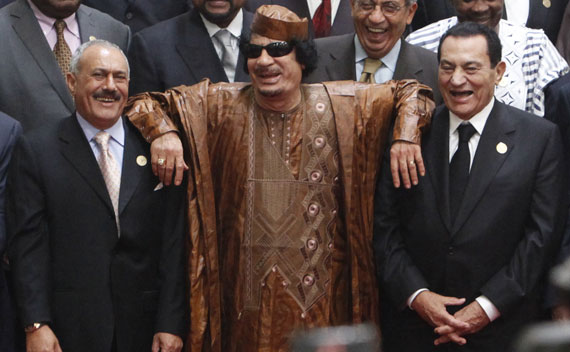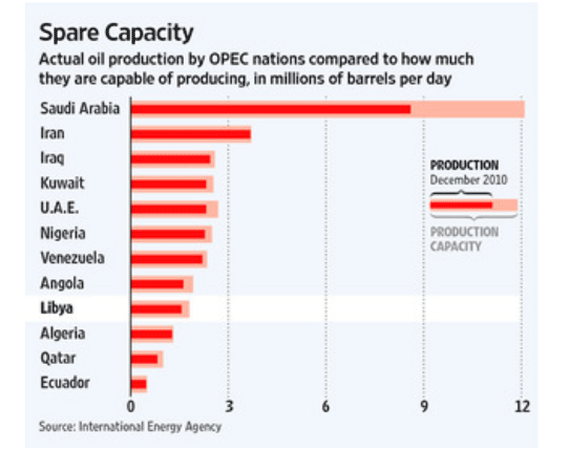Friday File: What If Qaddafi Is Right?
More on:

Above the Fold. In the middle of a long, rambling tirade that is his trademark, Libyan strongman Muammar Qaddafi declared on Wednesday: "If you destroy Libya, then Bin Laden will come, and Jihad will move from North Africa to Europe." What if the “mad dog of the Middle East,” as Ronald Reagan used to call him, is right? My boss, Richard Haass, has made this point forcefully, going so far as to predict: “The United States will be involved in counterterrorism operations in Libya two or three years from now because you will have a government that does not control all of Libyan territory…it’s Somalia on steroids.” That’s not a reason to want Qaddafi to hold on, and that most certainly wasn’t Richard’s point. It is a reason, however, to be thinking not just about what the United States should do about the fighting in Libya today, but also about what it should do to prevent Libya from becoming a terrorism nightmare tomorrow. Here we face two problems: We don’t understand the dynamics of Libyan society very well, and deficit reduction efforts in Washington guarantee that U.S. foreign aid budgets will be shrinking just at a time when more aid is needed.
CFR Event of the Week. Turmoil in the Middle East has sent oil prices higher, triggering concerns that the spotty global economic recovery will stall. So CFR was fortunate this week to host Justin Yifu Lin, the chief economist and senior vice president of the World Bank Group. He discussed the global financial crisis and the best way to facilitate a rapid recovery. You can watch the full video or download the audio to go.
Read of the Week. President Obama met with President Felipe Caldéron of Mexico yesterday. Both presidents stressed the importance of continuing to cooperate to defeat drug cartels. As a new CFR Council Special Report by David Shirk points out, making progress in the fight against drug traffickers requires the United States to take politically tough steps to curb the U.S. demand for drugs and to stop the flow of guns from the United States into Mexico. Don’t count on it happening any time soon.
Blog Post of the Week. David Rothkopf dismantles the latest buzzword in the “wonkosphere,” G-Zero—what Chris Nicholson over at the New York Times calls “this year’s buzziest buzzword.” G-Zero is the idea that no country or group of countries is powerful enough to drive the global agenda. Rothkopf pulls off three feats in his post: he reminds us that the United States, China, and the European Union still drive world politics; he meditates on why policy wonks like to coin buzzwords; and without a hint of irony he coins his own—G-X—or the idea that which countries matter will vary with the issue at hand. Well played, Mr. Rothkopf.
Poll Question of the Week. The political turmoil gripping the Middle East may be the focus of cable news coverage, but it isn’t high on the list of the American public’s priorities. The NBC/Wall Street Journal poll released this week provided a list of eight topics and asked respondents which one or two “should be the top priority for the federal government.” Only 1 percent named “Egypt, Libya, and the political unrest in Arab countries” as a top priority, and just 4 percent named it as the second top priority. So pundits and politicians calling for President Obama to do more on Libya will need to do a lot more convincing before the White House feels any political pressure to be decisive.
Chart of the Week. Disruptions in oil shipments from Libya have sparked new fears of an oil shortage and driven up prices on the world oil markets. The good news, as the chart below shows, is that while Libya is a major oil producer it is not a pivotal one. Saudi Arabia dominates world oil production, and it has substantial spare capacity. The Saudis have upped their production in recent weeks to help quell jittery markets. The bad news is that if political turmoil should hit Saudi Arabia no other country could make up the shortfall. The consequences for the global economy would be ugly.
Chart source: The Wall Street Journal
Too Good Not to Note. Garry Mitchell argues that Mark Twain’s advice to writers on the importance of knowing the difference between the almost right word and the right word applies equally well to America’s current predicament in the Middle East. New York Times editor Bill Keller reminisces about Mikhail Gorbachev’s and F.W. de Klerk’s falls from power and what lessons their departures hold for other countries. The New Yorker’s James Surowiecki explores how the ongoing rebellions in the Middle East owe as much to economic repression as they do to political repression, and why political reform may produce economic stasis. Ben Heineman over at Power & Policy covers similar terrain. Michael Shear reports that wrangling over the federal budget may force President Obama to postpone his upcoming trip to Brazil, Chile, and El Salvador. Walter Russell Mead writes that public sector unions are under pressure in blue states as well as red ones like Wisconsin.
Perils of Prediction. “I would like to suggest that Ronald Reagan is politically dead.” Tom Pettit, NBC’s political correspondent, on The Today Show, January 22, 1980, the day after Reagan lost the Iowa caucuses to George H.W. Bush.
Quote to Ponder. “The people that are sitting around saying, ‘[Obama’s] definitely going to be a one-term president. It’s going to be easy to take him out,’ they’re obviously political illiterates – political idiots, let me be blunt.” Former Arkansas Gov. Mike Huckabee.
A Reason to Smile. Opening Day is less than four weeks away.
More on:
 Online Store
Online Store
